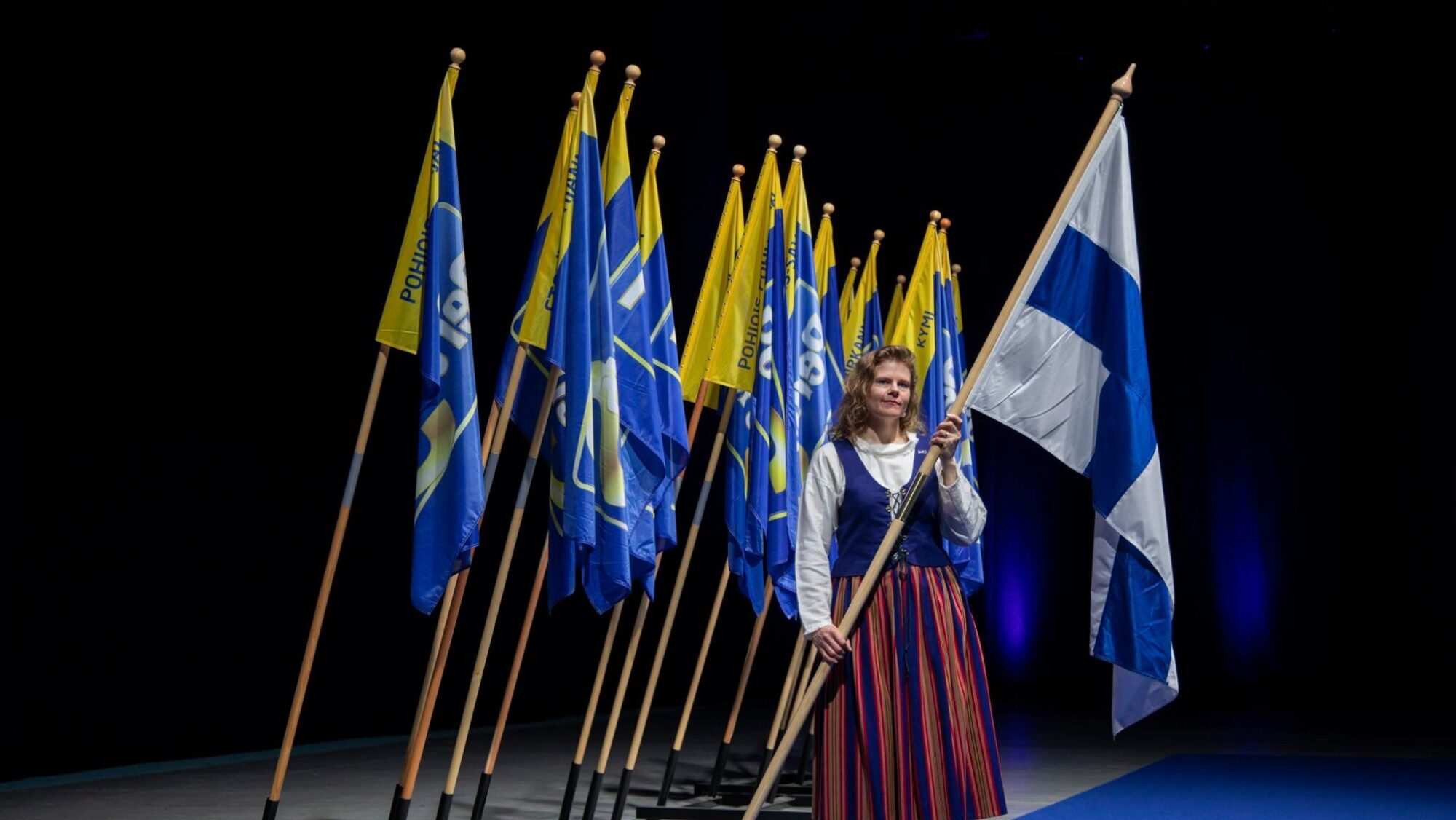
A woman holds a Finnish flag at the 2019 conference of the Finns Party
Photo: Perussuomalaiset on Facebook, 29 June 2019
Over a year since national elections saw the departure of Finland’s unpopular left-wing government led by Sanna Marin in favour of a four-party coalition of the centre and populist right next month’s June elections have the potential to replicate Helsinki’s grand alliance within the European Parliament.
The right-wing Finns Party secured concessions on citizenship requirements and climate policy after 74 days of coalition talks last June in a deal to prop up the centrist National Coalition Party of Finnish Prime Minister Petteri Orpo alongside the Christian Democrats and Swedish-minority People’s Party.
Despite media-contrived scandals about racist remarks by senior Finns Party officials and threats by Swedish People’s Party MPs to topple the government due to ‘extremism,’ Helsinki’s coalition has persevered as Finland settles into its new role within NATO.
To date, the campaign trail in Finland has been defined by questions of defence, migration, and a dispute about the European Commission’s role in regulating the country’s lucrative forestry sector. The Finnish government has consistently objected to the EU’s controversial Nature Restoration Law, which mandates the rewilding of 20% of land by 2030.
Fiscal issues are also important as the ruling coalition deals with debt problems inherited from the departed social democratic government. According to Tero Lundstedt from the Libera Foundation, a free-market think tank,
On both left and right, security-related issues and helping Ukraine dominate the political discourse. State indebtedness is high on the agenda due to the difficult situation in Finland, which is at risk of being included for the first time in the EU’s Debt Sustainability Monitor, which is a great embarrassment for a Nordic country.
Driven by the historic memory of Russian imperialism and geopolitics, there is a cross-party consensus regarding defence, with the Finns Party dropping its previous objections to NATO membership following the invasion of Ukraine.
In the weeks leading up to polling day, the Finnish Parliament has turned its legislative attention to asylum issues. A bill influenced by Finns Party Interior Minister Mari Rantanen would prevent migrants trying to cross the eastern border from seeking asylum. Finland extended the closure of its border stations with Russia, adding a number of ports to the closure last month. The country had temporarily closed the last border stations in November amid a surge of African and Arab migrants coming across the border in what Finland said was a deliberate weaponising of migration by Russia.
Division over Ukraine within the European Parliament’s nationalist Identity and Democracy (lD) group triggered the Finns Party’s largely symbolic defection to the more pro-Atlanticist European Conservatives and Reformists Party (ECR) group last year with many in Brussels seeing last year’s coalition with the centre-right as a prototype for future deals done at an EU and national level.
Currently, the governments of multiple EU member states, including Finland, Italy, and Sweden, are constituted by coalitions of ECR parties and parties from the more centrist European People’s Party (EPP). Given successful collaborations on the national level, this could model an alternative for the EU at large instead of the traditional left-liberal-green grand alliance within the European Parliament.
The Finnish EPP member, the National Coalition Party has left the door open for partnering with the ECR within the EU Parliament, despite vocal objections from the German CDU.
Regarding the potential of the Finns Party alliance with the centre being replicated in the EU Parliament, Tero Lundstedt said the National Coalition Party “has not ruled out cooperation with ECR as long as they are pro-Europe, pro-Ukraine, and pro rule of law,” warning EU institutions could face political paralysis as the details of an ECR-EPP alliance are worked out.
Lundstedt added that “ad hoc” cooperation instead of a formal alliance in the EU Parliament was also likely.
Regarding the potential of wider ECR-EPP co-operation, Finnish EPP spokesman Pete Pakarinen told The European Conservative that “we share the lines of [EPP president] Weber,” saying that parties on the right would need to maintain “pro-Europe, pro-Ukraine, pro-rule of law” stances..
Prime Minister Petteri Orpo clarified in an interview that his party intends to maintain the cordon sanitaire against the IID group in the European Parliament. “I see it as impossible for the EPP to cooperate with these real far-right parties,” Orpo said to Iltalehti.
